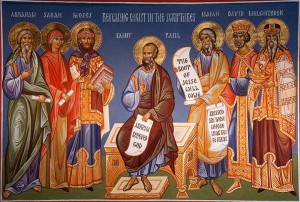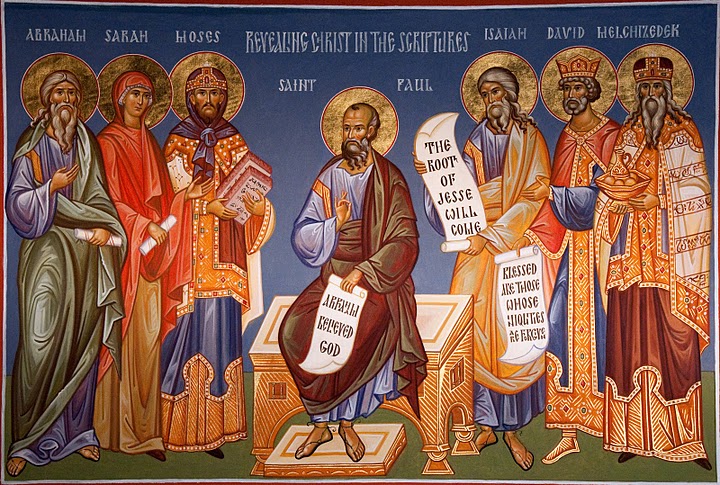 One of the most difficult but important things we can do as Mormons who are alerted to the complexities of cultural differences and sacred writings is to learn how to share in church settings insights we’ve gleaned from our studies. We have a dual challenge: (1) to try to be as faithful as possible to the scriptural text and the context in which it was written and the people who lived in those places and times, while (2) still honoring in some way the Christian and LDS overlays that have become deeply ingrained in ours and others’ faith journeys and worldviews—framings and understandings that can only generally handle grafting in a few new pieces at a time.
One of the most difficult but important things we can do as Mormons who are alerted to the complexities of cultural differences and sacred writings is to learn how to share in church settings insights we’ve gleaned from our studies. We have a dual challenge: (1) to try to be as faithful as possible to the scriptural text and the context in which it was written and the people who lived in those places and times, while (2) still honoring in some way the Christian and LDS overlays that have become deeply ingrained in ours and others’ faith journeys and worldviews—framings and understandings that can only generally handle grafting in a few new pieces at a time.
In this episode, panelists Jana Riess, Philip Barlow, and Carrie Miles join Mormon Matters host Dan Wotherspoon for an exploration of the Old Testament, paying particular attention to this delicate dance of faithfulness to both text and communities. What important framings might we offer as teachers or class members that can help open the discussion beyond just literal readings or approaches that assume that ancient Israelite rituals, temples, and practices were really just like ours of today, that these ancient peoples were essentially “proto-Mormons,” hardly different at all from us in their doctrines of God and sense of what things mean? What riches does the Old Testament possess that would be wonderful to convey even if they might complicate current LDS assumptions?
This is a rich discussion that might take a couple of listenings to really mine. Please do listen and share your ideas and comments in the section below!
Links (items mentioned in the episode or from readers):
Jana Riess, The Twible: All the Chapters of the Bible in 140 Characters or Less
. . . Now with 68 % More Humor
E. A. Speiser, Genesis: Introduction, Translation, and Notes, The Anchor Bible, Vol. 1
Everett Fox, trans. The Five Books of Moses, Schocken Bible, Vol. 1
John Goldingay, “For Everyone” series on various books of the Bible
David A. deSilva, Honor, Patronage, Kinship & Purity (focuses on New Testament but many of the family systems are same as in Old Testament times)
Kenneth E, Bailey’s books on Jesus through Middle Eastern Eyes and Paul through Middle Eastern Eyes
The New Interpreter’s Dictionary of the Bible (5-volume set), Abingdon Press (prices vary greatly but widely available)
Raymond E. Brown, The New Jerome Bible Commentary
The Jewish Bible: Tanakh (Jewish Publication Society translation)
From listener Ron Tenney (with his comments):
NIV Archaeological Study Bible: An Illustrated Walk Through Biblical History and Culture
This is a wonderful text with easy to follow topical discussions. I like it because it confronts many of the controversies of the Bible with openness yet provides a reasonable “faithful” interpretation of the text.
Jonathan Burnside, God, Justice, and Society: Aspects of Law and Legality in the Bible
This is a pretty technical book that explores modern laws as seen as influenced or as an outgrowth of Old Testament biblical law.
The Five Books of Moses: A Translation with Commentary by Robert Alter
Amazing commentary on the text of the Books of Moses with extensive footnotes.


Comments 13
Can you post links to the books that the hosts suggested?
Just linked to them. Sorry for delay!
Pingback: How do Mormons teach the Old Testament? | Flunking Sainthood
What a conversation! I’m encouraged to hear a number of my own thoughts on this topic mirrored by the panelists, For instance, as a Gosepl Doctrine teacher I’ve always focussed on promoting faith, regardless of whether the lesson manual aligns with my own beliefs or not and what kind of gyrations I have to go through to get there. Also I haven’t hesitated for a second to search for insight anywhere I can find it. I plan on listening to this episode several times.
Teaching GD to a non-academic, but well-educated, affluent, and faithful congregation in Folsom, CA, and commissioned to teach according to the GD manual and the scriptures, I find no difficulty in including Torah in my scriptures. Though not all the thoughts, insights, and interpretations are applicable to LDS theology, I am impressed that there is much known by Jewish scholars that is consistent with LDS theology, but not to secular Christianity.
My first time with Mormon Matters. I nearly gave up because the introductions took so long. I’m glad I persevered, as I gained some useful ideas for my new calling as GD teacher. Thank you.
Glad you stuck with it! Usually not this long of a preamble. My fault in chatting with my friends!
Also, I’d asked Carrie ahead of time to give us a burst on her work teaching the Bible in African and other settings, so that may have felt like “intro” when it was something substantive I’d asked for ahead of time.
May I be so bold as to add a few suggestions to the reading
list?
NIV
Archaeological Study Bible: An Illustrated Walk Through Biblical History and Culture
This is a wonderful text with easy to follow topical discussions. I like it because it confronts many of the controversies of the Bible with openness yet provides a reasonable “faithful” interpretation
of the text.
God,Justice, and Society: Aspects of Law and Legality in the Bible
This is a pretty technical book that explores modern laws as seen as influenced or as an outgrowth of Old Testament biblical law.
The Five Books of Moses: A Translation with Commentary by Robert Alter
Amazing commentary on the text of the Books of Moses with extensive footnotes.
Just my 2 cents worth. Thanks for the podcast.
Ron Tenney
Thanks, Ron! I’ve now added these with links in the body of the blog post above.
Thanks for this episode and the continuing series diving deeper into the Old Testament text. Really helpful and fascinating! I’m excited to teach gd this year.
A family member recommend How To Read the Bible by Marc Zvi Brettler as a good resource. Anybody familiar with it?
Pingback: 076: Introduction to the Old Testament | Mormon Sunday School
Really enjoyed this discussion!
The title of this webcast intrigued me but did not directly deal with a concern of mine. I wrote something kind of too small to be a book and I named it “Eden”. It pretty much annihilates the common thought about what happened in Eden and why it happened. The members of the Church have the revelations but they are grossly misinterpreting what they are reading. I wanted to publish it so I found a website called Church Publishers. I tried three of them: Deseret Book, Ebborn Books, and BYU. No go. This is an LDS subject but my handling of it is not very mainstream. Do you have any suggestions? Instead posting this, you might just want to email me.